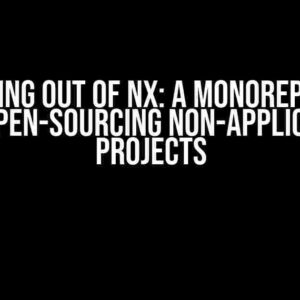Are you tired of living in the past? Are your old Android apps still stuck in the Stone Age of Gradle 3.3? Fear not, dear developer, for we’re about to take a thrilling journey through the ages, bringing your dusty old app up to speed with the latest and greatest Gradle 8 has to offer!
Why Upgrade, You Ask?
Gradle 8 has brought a plethora of exciting features and improvements to the table. From faster build times to better error handling, upgrading your app will not only future-proof it but also improve your development experience. So, what are you waiting for? Let’s dive in and get started!
Step 1: Prepare for Lift-Off!
Before we begin, make sure you have the following installed on your machine:
- Android Studio 4.2 or later
- Gradle 8
- A dash of patience and a willingness to learn
Step 2: Identify the Culprits
In your old project, identify the build.gradle file that’s still clinging to the past (Gradle 3.3). You can find it in the root directory of your project. Open it up and take a deep breath, for we’re about to embark on a transformation!
// build.gradle (old)
buildscript {
repositories {
jcenter()
}
dependencies {
classpath 'com.android.tools.build:gradle:3.3.0'
}
}
Step 3: Update the Gradle Wrapper
In the terminal, navigate to the root directory of your project and run the following command to update the Gradle wrapper:
gradle wrapper --gradle-version 8.0.2 --distribution-type all
This will update the Gradle wrapper to the latest version, allowing us to take advantage of Gradle 8’s features.
Step 4: Update the build.gradle File
Now, let’s update the build.gradle file to use Gradle 8. Replace the old content with the following:
// build.gradle (new)
plugins {
id 'com.android.application'
}
android {
compileSdk 31
defaultConfig {
applicationId "com.example.app"
minSdk 21
targetSdk 31
versionCode 1
versionName "1.0"
}
buildTypes {
release {
minifyEnabled true
proguardFiles getDefaultProguardFile('proguard-android-optimize.txt'), 'proguard-rules.pro'
}
}
compileOptions {
sourceCompatibility JavaVersion.VERSION_1_8
targetCompatibility JavaVersion.VERSION_1_8
}
}
dependencies {
implementation 'androidx.appcompat:appcompat:1.3.1'
implementation 'com.google.android.material:material:1.4.0'
}
Step 5: Update the Project Structure
In the project settings, update the Gradle version and Android Gradle plugin version:
| Setting | Value |
|---|---|
| Gradle version | 8.0.2 |
| Android Gradle plugin version | 7.2.2 |
Step 6: Resolve Dependencies
In the terminal, run the following command to resolve any dependency issues:
gradle build --refresh-dependencies
Step 7: Fix Compatibility Issues
As you’ve updated your app to use Gradle 8, some compatibility issues might arise. Fix them by updating your code to comply with the latest Android Gradle plugin and Gradle 8.
Some common issues you might encounter include:
- Java version compatibility: Update your Java version to 1.8 or later.
- AndroidX migration: Migrate your app to use AndroidX libraries.
- Gradle plugin compatibility: Update your plugins to be compatible with Gradle 8.
Step 8: Test and Refine
Finally, test your app thoroughly to ensure everything is working as expected. Refine your code, fix any issues that arise, and prepare your app for release!
Conclusion
Voilà! You’ve successfully upgraded your Android app from Gradle 3.3 to Gradle 8. Pat yourself on the back, dear developer, for you’ve taken a huge step forward in future-proofing your app. Remember, staying up-to-date with the latest technologies is crucial in the ever-evolving world of Android development.
So, what are you waiting for? Share your experiences, ask questions, and show off your revamped app in the comments below!
Happy coding, and see you in the next article!
Frequently Asked Question
Are you struggling to upgrade your Android app from years ago to the latest Gradle version? Worry not, we’ve got you covered! Here are some frequently asked questions and answers to help you overcome the hurdles.
Q1: Why do I need to upgrade my Android app to the latest Gradle version?
Upgrading your Android app to the latest Gradle version is essential to ensure compatibility, security, and performance. Newer versions of Gradle often include bug fixes, new features, and improvements that can enhance your app’s overall user experience. Moreover, Google Play Store’s policies require apps to target a certain API level, making it necessary to upgrade your app to stay compliant.
Q2: How do I check the current Gradle version of my Android app?
To check the current Gradle version of your Android app, open your project in Android Studio, navigate to the `build.gradle` file, and look for the `gradle` version specified in the `dependencies` section. You can also check the `gradle-wrapper.properties` file, which specifies the Gradle wrapper version.
Q3: What are the steps to upgrade my Android app to Gradle 8?
To upgrade your Android app to Gradle 8, follow these steps: 1) Update your `build.gradle` file to use the latest Gradle version. 2) Update your `gradle-wrapper.properties` file to use the latest Gradle wrapper version. 3) Migrate your code to be compatible with Gradle 8. 4) Test your app thoroughly to ensure it works as expected. 5) Finally, update your app’s `build.gradle` file to target the latest API level.
Q4: How do I resolve common issues that arise during the upgrade process?
To resolve common issues that arise during the upgrade process, refer to the official Gradle documentation, Android developer documentation, and Stack Overflow. You can also seek help from online communities, such as Reddit’s r/androiddev, or hire a professional developer to assist you.
Q5: What are the benefits of upgrading my Android app to Gradle 8?
Upgrading your Android app to Gradle 8 offers several benefits, including improved performance, enhanced security, and better compatibility with the latest Android operating systems. You’ll also gain access to new features, such as improved build caching, and be able to take advantage of the latest AndroidX libraries.


